African Foods
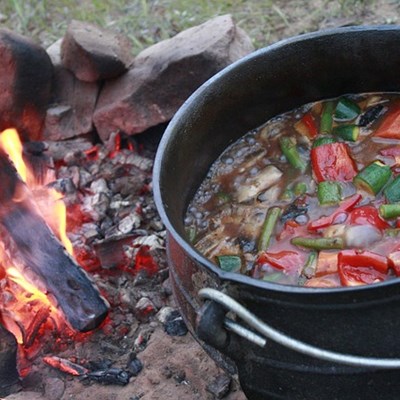
“Eat when the food is ready; speak when the time is right”
-African proverb
Zanzibari food
Food in Zanzibar is influenced by African, Asian and Arab cuisines, amongst others, due to being situated along a trade route. Cloves, which are grown there, and other spices feature strongly on the menus.
Ali Abubakar, Zanzibar, on Zanzibari food:
“[We eat] mostly vegetables, like, green bananas, peas, rice and curry, rice and fish and then in the evening you have like supper. Evening comes in very, very early, in that you have twelve hours of daylight, ehm, because we were pretty close to the equator…”
Ali Abubakar, Zanzibar, on food in Glasgow:
“Everything, ah, food was absolutely terrific when I first came here…apart from things like apples, cause we didn’t have apples in Zanzibar. I could not eat fruit and I went through many years without being able to eat fruit. Because every fruit (laughs) tasted like, horrible. So, I don’t know how others like me felt. That was the thing, it was full of fruit. Everything was sweet… See my wife buys loads of fruit and it’s only recently that I’ll get up and get an orange and eat it and now I find it really sweet. But before (laughs) I couldn’t. I used for a long time before I lost my vision. I used to do most of the cooking and I did that, yes. Well, I cooked both. Back then I’ll cook curry, I’ll cook vegetables, close to the way we cooked at home… Yes, now it’s pretty easy, it’s not all that difficult to get things from Africa.”
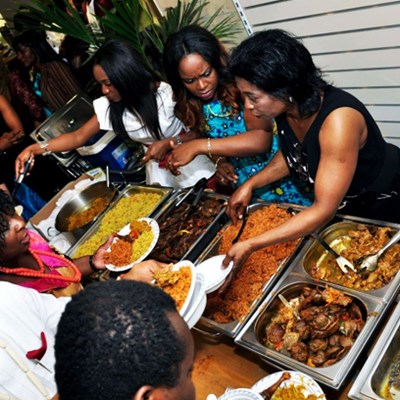
Peanuts
Dishes featuring peanuts, such as peanut soup and peanut stew, are immensely popular in West Africa and can be found in other places in Africa as well.
Chief Amu Logotse, Ewe, Ghana, on how he learned to cook:
“Oh boy, my grandmother makes me peanut butter soup and rice, delicious. That’s the Gambian national dish. I didn’t even know that, but I like that. I, I don’t drink, I don’t smoke, but if the food is good, I’ll eat it, but if it’s got chicken in it, forget it, I’m not having it. I used to breed them… Yes, again, my grandmother had a rule, which we all had to adhere to. See, if you’re not home by 6 o’clock for the communal meal, you cook your own food. Now, because of my grandmother’s rule, and she kept to it very, very rigorously. When you come home, there’s no food but there’s a lot of raw material. So, you have to learn to cook. But, all the boys in the extended family, we all cook and when we cook the girls laugh at us and they tell us that we will never get married. And they say that a lot in Ghana. That, if you are a man and in the kitchen, your wives will run away. But it didn’t scare us, we went ahead. But the they realised that we cook different from them and they want us to cook.”
Chief Amu Logotse, Ewe, Ghana, on bringing his culinary skills to Scotland:
“But when you go to boarding school you have to cook for yourself, there are no women, there are no wives, there are no girlfriends. And we used to cook. And we used to cook in the bucket. On the iron we used for…you put charcoal, we all contribute charcoal, we put it in, you fan it with your book. You put it on, it boils. We eat communally. That is cooking… I was asked to devise a cross-curricular activity. So, I devised one. So, I go into schools and I introduce…to geography, I introduce a cash crop. Talk about it how it grows, you know, the conditions. The fact that it cannot grow in Scotland is an exciting one. And then you show it to them and we take it into home economics and we eat it. So, I had to cook it for them… Everything, tubers, you know, yams, plantain. You know, black eyed peas, garri from cassava. You know, we even substituted some of the leaves that we normally make stew with. I mean I love spinach, so we make spinach stews. Fried peanut butter and rice is popular but, of course, I do it with fish. And once we did it in Selkirk and they broadcast it on the local radio and the queue just went around the block.”
Couscous
Couscous is the staple of food of Algeria, Morocco and Tunisia. It Is used both day to day and ceremonially.
Bouhadjar Mourad, Algeria, on his national dish:
“The food, the food, yeah nice. We’ve got like, traditional food anyway, so we’ve got the couscous. We make the couscous with fish, with chicken, or couscous with the meat, so different type of couscous we are doing.”
Stockfish
Stockfish is an unsalted cod that has been dried and can last for years. It is one of the oldest preserving methods in the world. It is said to be perfect for the Nigerian palate as it has a big bold flavour.
Chief Josephine Oboh-Macleod, Esan, Nigeria, on the availability of African food in Scotland:
“Most ingredients we can get but a lot of it…sometimes you wish you had somebody coming from home and it’s a specialist ingredient. You like them to bring…like my sister brought a lot of specialist ingredient for me. So, I now, obviously, kept it in the freezer and in a special box and use very sparingly, so it can last me for a long time. You have one [African food shop] on Sauchiehall Street. Particularly in the Savoy Centre. She sells some good selection of foods across western Africa. And I notice across from her, there is an Iranian or Moroccan also selling the Northern type ingredients. So, I think they said there’s one in Maryhill also that does the African shop. But I’ve not been to that one. But I use the one in Sauchiehall Street. The one in Aberdeen, just off Union Street, because I feel she has actually a good selection. ‘Cause stock fish…funny enough stockfish came from Norway. They brought it to Nigeria, to the eastern part of Nigeria, called the Igbo area. And they got hooked on and now the rest of us are now hooked on it. So, if we cook, there are certain things you don’t put together. Like not stew, but, if you cook some of these traditional things, like ogbono with stockfish. The smell of it, sorry this dried stockfish, the house…it takes days and days to air it out but for me I feel it’s delicious.”
Yam
The New Yam Festival happens every harvest time in many areas of West Africa. It is carried out as a thanks for a successful harvest. The Igbo people of south central and south eastern Nigeria are particularly famous for their New Yam Festival. Yams are a staple in West Africa featuring in many dishes that include pounded yam and fufu.
Ogbono Soup
Ogbono soup is a Nigerian dish made with ogbono seeds (from a tree), which darken the mixture. It often also includes bitter leaf, chilli, fish or meat and tomato sauce.
Melon Soup
Nigerian melon soup has melon seeds and fish, or meat and stockfish, and crayfish, pumpkin leaves and pepper as ingredients.
Ofomu Clark, Edo State, Nigeria, on food in Nigeria and in Glasgow:
“[We eat] pounded yam and different type of soup to go with them. Then we have the staple food, which is the rice. The jollof rice or fried rice and chicken, beef and drinks are valuable as well. We’ve got different types of soup. You know our traditional soup. We’ve got the melon soup we’ve got the ehm, ogbono soup… I still prepare traditional foods, ehm, I still wear my traditional attires… I’m trying to get my sons to know the traditional way and they love traditional food as well.”
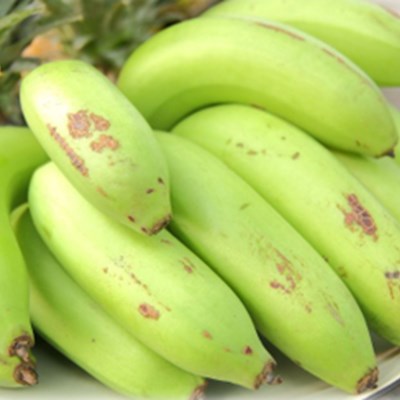
Bananas
Green bananas are used in a lot of meals in East Africa. Respondents from Uganda and Zanzibar have talked about them. Bananas are generally very popular and are used to make traditional beer in the region.
Guy Ngansi Deyap, Bamiléké, Cameroon, talks about the green banana-based meal that he cooks at home in Glasgow:
“We call it banane malaxe. In our region, we got so many different speciality we prepare. And it’s difficult to say, “The main speciality is this.” Because we’ve got taro, we got banane malaxe…just so many. We are the farmers… It’s banana. So, that is something for poor people. Because if you don’t have money, you can cook that easily. Because you’ll get just the banana and the peanut and some greens, vegetables and that’s it. It tastes nice. Or you can get some dried fish into it or whatever. So, it’s easy to prepare. No complication and people love it because it tastes so good. Even, it’s a poor person food (laughs)… The palm wine is our main drink, you know. And, eh, you can’t do anything without the palm wine. Even you get the nice food. You need the palm wine to go with.”
Okra Soup
Okra soup is cooked with red palm oil and crayfish (a staple of West African dishes) and meat, sometimes tripe, and green leaves.
Banku
Banku is chiefly a Ghanaian dish and is made from fermented corn and cassava dough, mixed into a paste.
Anani Fiado (Joe), Ewe, Togo:
“We have okra soup with red oil. We have palm soup, we have banku and we have rice and beans. Rice and beans with the black pepper with the stew. It’s very nice. And, eh, they will fry the meat with cow meat. But they will fry it before putting it inside the stew. Yeah, and sometimes they will fry the fish and put it on the side. Yeah, they will cook different food, jollof rice. Jollof rice…you will make a stew with tomato stew, then you put the rice inside. Then they will have rice with egg. Rice with tiny, tiny meat with egg is like Chinese rice. There are the things they will cook different and they will have the traditional drinks. Then they will have traditional juice. Those who don’t drink. They have also drinks for them. And they have a traditional whisky called schnapp… Yeah of course, you can get anyone here… Yeah, the palm wine some shops sell it but I don’t think it will be like the one (laughs). The pitou, the pitou is difficult to get here, yeah, because it’s very strong drink.”
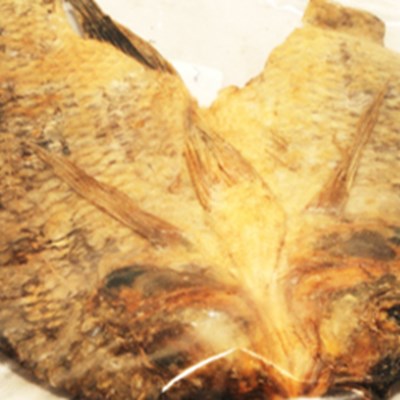
Makayabu
Makayabu is dried salted saithe fish, which is a very popular element in the cuisine of the Congo. The siathe is a fatty fish and therefore produces a unique taste when cooked.
Lydie Bere Flere Dossa, Akan, Ivory Coast, on food at home and in Glasgow:
“Wow, wonderful. Ivorian food…most of African food, there’s a lot of taste on it. The typical African food, the central thing is the taste. It is never tasting bland, whatever the region. It always have its unique taste, yes. Some places have common taste and some people have unique tastes. You know? Like, eh, West Africa, most of the dishes have similar tastes. And it different from Central Africa. In Central Africa, like Cameroon, Congo. The way they are cooking it, the taste…the ingredients they are using in it. They don’t use this in Ivory Coast. You know? When I was in Ivory Coast. I didn’t know it. But when I came abroad here, I notice it. Because when I want to eat, my friend from Ivory Coast is doing the ndole. Is peanut. Peanut is from Ivory Coast. Bitter leaf is from Ivory coast as well. You know? But the way she blend it and do it. I never knew that this is the way, it was lovely and put the gan in. The gan, in my country…you use it to clean ourselves when you are not feeling well. Like a medicine. They ground it down and you drink it, but she use it in food, to eat. I like to…I’m very curious in food…It was a pleasant one to eat. You know? So this was different. I went to Congo they was eating the salty fish, makayabu, that I never eat in my country. I said, “How come salty fish you can eat it?” But they salt it first before to cook it. So, this is another experience as well. So, the way she does it, it was very lovely. So, if I go today in Ivory Coast, I can cook makayabu as well. Say my friends this is from Congo. Who say, “Wow, it’s lovely. This ndole, oh, it’s lovely.” So, them too, they eat from my country, like attiéké. They really love it. It’s really lovely. The way you make it, it’s like a couscous, the way you make it with fish or chicken… The ingredients are quite expensive here. Because there is some shop whose selling it. Because people ship them from different countries, like I say, and bring it there… So you have some shops here. African shops, Pakistani shops. They are selling African food. It’s expensive, but we are trying our best. And when you travel like this as well. We are just trying to make our stock last forever before you go again and bring it. This is the way it is.”
Iko Prince Meko, Ohafia, Nigeria, on the differences between food in Nigeria and in Glasgow:
“I’m missing a lot like food, are lot of leaves, that I can’t find here… Seafood here is quite different from I had, because ours is very, very organic. Tropical.”
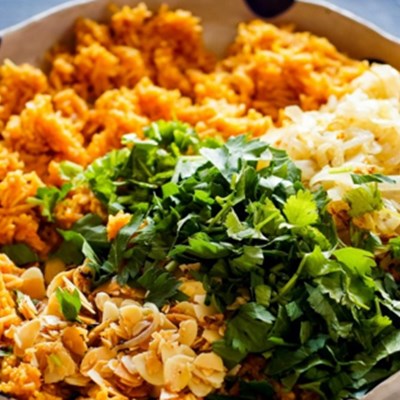
Attiéké
Attiéke is made from cassava pulp to produce a paste similar in consistency to couscous. It is part of the cuisine of the Ivory Coast.
Urhobo Soup
Urhobo soup is a Nigerian soup, which can have shellfish, beef, tripe and other meats, and seafood and fish as components. It has a stockfish and spicy pepper base.
Gloria Oju Onyekwere, Kaduna State, Nigeria, on food in Glasgow:
“Yes, my food, I’m not letting go and, ehm, my kids love it, which is urhobo and pounded yam. I remember when my son went to school the first time, nursery, three, you know, because I’ve always made him urhobo soup and that’s his favourite, so the nursery teacher said to him, “So, we’ve got soup, what kind of soup do you want?” And my son said, “Can I get urhobo, please?” Then when I came to pick him up, they were asking what it was (laughing).”
Nsima
Nsima is a form of thick maize porridge, which is very popular in Malawi and eaten with many types of food.
Maria Rose Ngosi, Malawi, on her favourite food and why it is not difficult to cook here:
“Eh, my favourite food is nsima, with tilapia. In Malawi we call it chambo… Malawians, mainly the spices are just coming from all over. But if I go to my grandmother’s house, if they want to cook for me, they will only use water and tomato and onion. Yes, maybe no oil and the food taste delicious. But because nowadays things are integrated, we have also integrated. So, we have loads of spices but from other countries.”
Nassar Lulu, Baganda, Uganda, on food in Glasgow:
“In Uganda, we don’t eat so many animals, we don’t eat sheep, but here, there is no way you can get goat here either. For me if I go to by meat. I just buy the half sheep here… For me, in my culture, for me, Baganda, we don’t eat sheep, we eat goat… We do our own porridge, we grind the corn, we boil the water, we mix them, that’s the porridge we do… For me I am a grown-up person but I still struggle to eat prawns here. I just take them on the side and I leave them (laughs). This guy says, “This is just a prawn.” I say “No, they never told me to eat this. I never seen it before.””
Garden egg
One of our respondents from the Edo group of people of Nigeria talks of cooking garden egg and mint stew here in Glasgow. She tells us that both plants are considered to be beneficial to the digestive system. Garden eggs are from the same species as the aubergine or eggplant but unlike an aubergine they are actually shaped like the eggs of hens and ducks. They are popular throughout many parts of Africa for their bitter taste and for their ability to be stored well. Some people prefer them white and fresh whereas others prefer them ripened and yellow.
One of our respondents has very kindly given us the recipe for one version of garden egg stew (see post from a few weeks ago). She has also told us where she gets garden eggs in Glasgow. She said that this recipe is both simple and tasty. Happy cooking!
Garden Egg Stew (Serves 4 Persons)
Garden eggs (6 to 8) pieces
Onion - 1 bulb chopped
Tomatoes - 2 large size, chopped
Chile pepper - 1 -2 pieces or use a sprinkle of a grounded one to taste
Crayfish grounded - 1/2 cup
Stock cubes 2
Boiled pieces of meat (optional)
Smoked fish washed and deboned (optional)
Smoked big prawns washed in hot water (optional)
Palm or vegetable oil
1/2 cup of salt to taste
Method:
Boil garden eggs in water. Remove the skin and mash lightly making sure you do not mash the seeds otherwise it gives off a bitter taste. Sauté the onion in oil add the garden egg for a few minutes. Then add the other ingredients and cook for about 5 to 10 minutes. If too thick you can add a bit of water. Season with salt to taste.
You can serve with boil yam or boiled plantain especially unripe plantain or pounded yam or grain mix, fufu, garri, or boiled rice.
In Glasgow, garden eggs can be bought from the African shops in The Savoy Centre and next to Tesco in Maryhill, amongst other places.
Jollof Rice
Jollof rice is popular all-over West Africa and is often served at events. It consists of rice with chunks of vegetables and meat or fish. There is some controversy over which group of people in West Africa invented the dish, as it is a beloved dish which everyone wants to claim as their own.
Kaddi Jatu Jobe, Mandinka, Gambia:
“Yeah, jollof rice, spring rolls, fish fry, grilled chicken, grilled chops, pasta, couscous… Drink, you mix ginger and pineapple together, soak in water, with sugar for flavouring. It’s a really nice flavour.”
Rohay Conteh, Mandinka, Gambia, on food used at celebrations in Glasgow:
“Benechen, jollof rice, that is like a fried rice, peanut butter soup. Oh yeah, we have quite a few of them. Quite nice, we cook them with loads of vegetables, and they cook it, sometimes in only one pot and serve in a big bowl.”
African beer
Many Africans were using traditional techniques to brew beer long before Europeans introduced their systems for the process during the colonial era. In many parts of East Africa, banana beer is used during traditional ceremonies and can be one of the few sources of revenue for local economies. It is made with a particular type of banana (which is not so good to eat) and mixed with a locally sourced yeast, such as sorghum. Internationally produced beers are rare and usually different from local varieties, which have been described as tasting like "unfiltered apple juice combined with a hefty dose of vodka!"